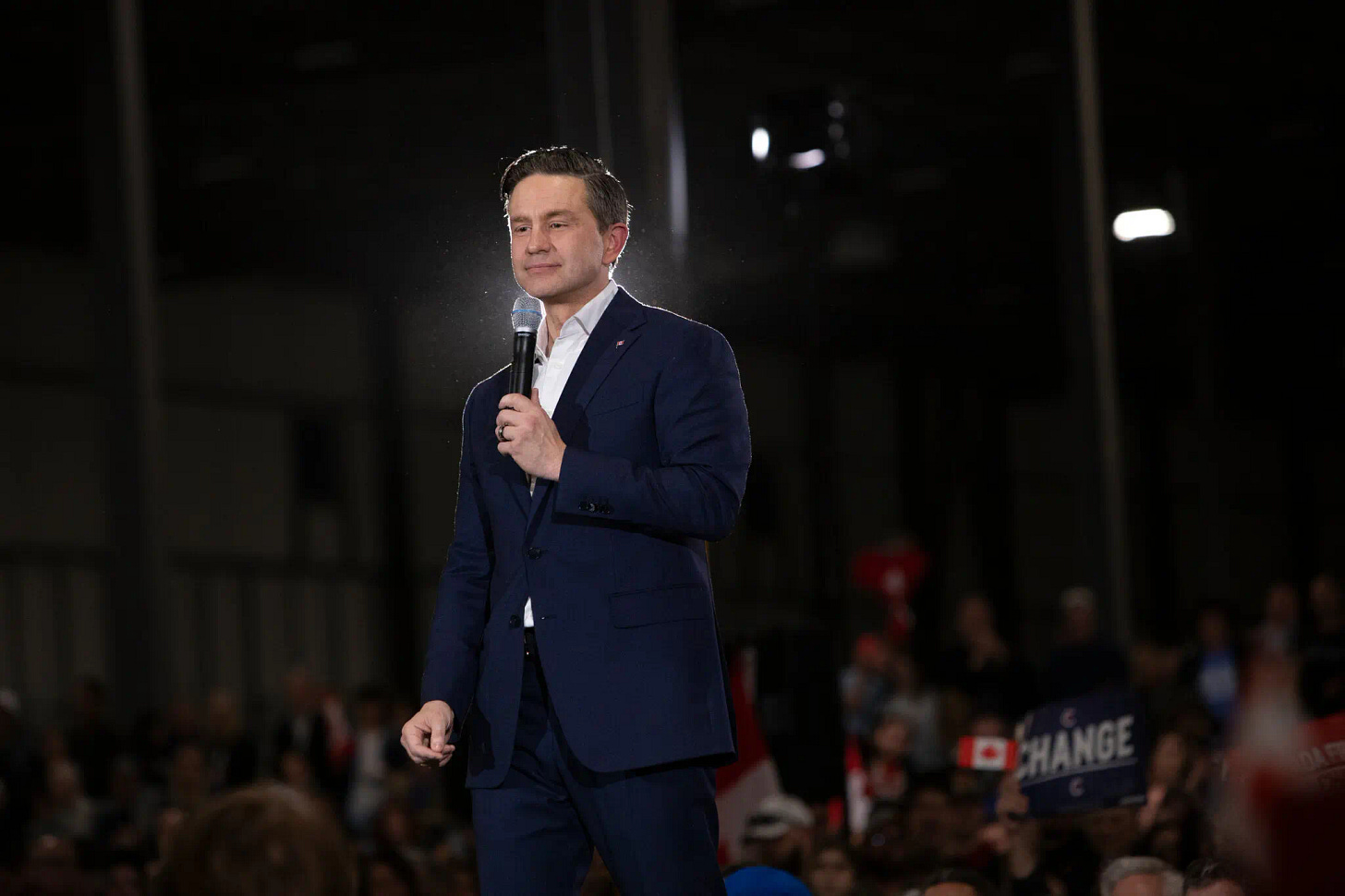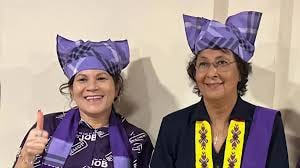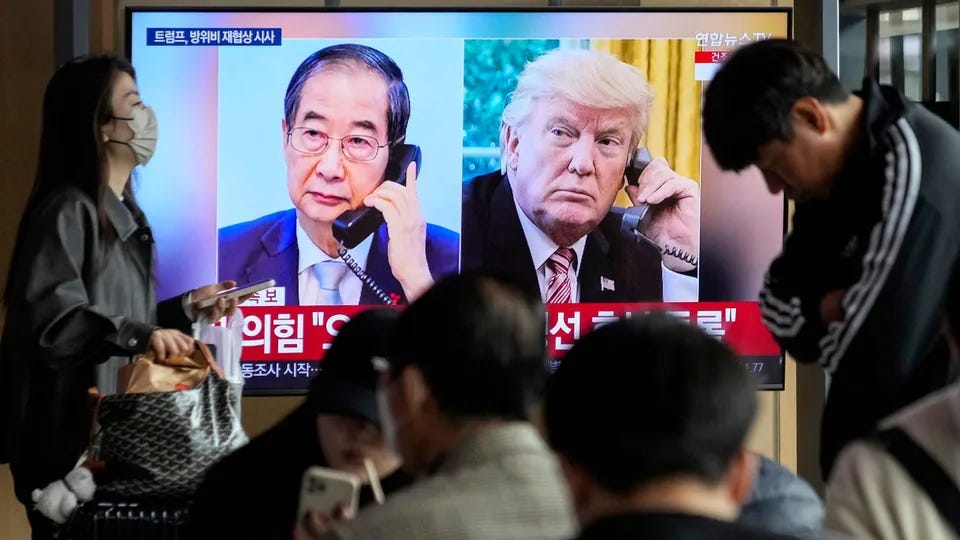More foreign affairs in a crazy, mixed-up world
Canadian elections overshadow upcoming leadership polls in Portugal, Romania, Suriname, and South Korea
National elections in Canada have dominated the news this week, with Liberal Prime Minister Mark Carney—in office less than two months—marking a come-from-behind surge to take the top prize, bolstered by a surge in popularity after standing firm in the face of U.S. President Donald Trump’s aggressive tariff policy—and leading Canada’s so-called “anti-Trump” movement.
And while at this writing, it is still not clear whether Liberals will finally claim a majority in the Canadian parliament, which has eluded them for years, what is apparent is that Carney’s party turned back a strong challenge by the Conservatives, led by Pierre Poilievre—who astonishingly enough, lost his own 21-year seat in the process.
From Conservative Prime Minister-elect to failed politician in one day: Pierre Poilievre. Courtesy New York Times
Easily the most important political event of the spring internationally—at least in the Western Hemisphere—the Canadian election outcome has significant implications for the long-term future of the NATO alliance, as well as for the country’s short- and medium-term relations with its southern neighbor—and former best friend. The final results should be known by the weekend.
But in its shadow, four other significant elections are following in rapid succession, three of them taking place in other traditionally strong U.S. allies—Romania, Portugal, and South Korea—and a fourth in Suriname, an emerging key player in Caribbean politics. And in at least three of those four, ties to either the United States, the EU, or NATO—or all of the above, in two—appear to be playing a stronger role as an issue than in past elections dominated by domestic matters.
How much of an role will Trump sentiments—pro or anti—play in those countries?
A page back in time ... is a reader-supported publication.
To receive new posts and support my work,
consider becoming a free or paid subscriber.
* * * * * * *
As a “reformed” Foreign Service Officer—I walked away from the State Department in 1997—I keep my eyes out for unusual and outrageous events occurring in countries of interest to the United States, particularly those I have served in or visited. This occasionally includes analyses of U.S. actions affecting those countries, whether wise or effective—or neither—and in some cases, simply astounding.
Of the four countries whose democratic elections I explore today, I have served in only one—Suriname, where I was posted to the U.S. embassy in Paramaribo in 1989 and 1990—but have long been a keen observer of politics from afar in Romania, Portugal, and South Korea.
Romania (first round, May 4; runoff set for May 18, if needed)
In Romania, another strong NATO ally, the rescheduled presidential election from last November—which should have been concluded with a runoff in early December—took a suspicious detour in late 2024. Election results were first validated, then nullified by the country’s constitutional court after the strong first-place showing by an obscure right-wing professor seen as suspiciously close to Russian president Vladimir Putin.
The Bucharest court abruptly struck down the first-round election result—in which Calin Georgescu polled nearly one-quarter of Romanian votes—after top-secret intelligence on alleged Russian meddling was suddenly declassified by the outgoing president, Klaus Iohannis. Georgescu was then banned from taking part in the May 4 rerun, along with Diana Sosoaca, former European Parliament member with a clownishly colorful past—both for their “dangerously” pro-Russian views—and 10 others, for various reasons.
An increasingly chaotic campaign atmosphere is now plaguing Romania, fueled by wild charges and rampant social media disinformation—with a dozen candidates still on the ballot, including two previous candidates: Elena Lasconi, a small-city reformist mayor and the second-place finisher from November; and George Simion, leader of the far-right Alliance for the Union of Romanians (AUR), the country’ second-largest party in Parliament, and a Euro-skeptic Trump supporter expected to snare first place with as much as 35 percent on May 4—but not widely expected to win a runoff.
Nicusor Dan, the popular center-right mayor of Bucharest, favors continuing military aid to Ukraine; he is generally favored to take second place on May 4 and then to win a subsequent runoff against Simion, who finished fourth in November.
Simion’s party’s “Romania First” slogan hints at gradual disengagement from both NATO and the EU, and he clearly opposes further military aid to neighboring Ukraine, even though he has called Vladimir Putin a “war criminal” in past months. [See “Romanians confront a deluge of online disinformation,” April 27, https://www.myjournalcourier.com/news/world/article/romanians-confront-a-deluge-of-online-20296590.php .]
Embracing Trump’s MAGA movement full-on is Romania’s wannabe-president, George Simion. Courtesy Insider
Heavy criticism of the Georgescu ouster by Trump and his administration officials have energized some voters but alienated others, especially pro-EU and pro-NATO Romanians who favor aiding Ukraine and keeping neighboring Moldova, a close ally, safe from Russian pressure. [See “Romania presidential election rerun under Trump shadow,” April 28, https://www.france24.com/en/live-news/20250428-romania-presidential-election-re-run-under-trump-shadow .]
For his part, Simion is pulling out all the stops, telling Politico this week that “We [AUR] are the natural allies of the Republican Party and we’re almost perfectly aligned ideologically with the MAGA movement.” Simion made the remarks after returning from a visit to Washington. [See “MAGA man leads the field, April 29, https://www.politico.eu/article/maga-romanian-election-rerun-donald-trump-romania-presidency-sunday-vote/ .]
* * * * * * *
Portugal (parliamentary elections May 18)
Portugal’s snap elections were triggered by a no-confidence vote in the Portuguese parliament in March. Prime Minister Luís Montenegro, leader of the center-right Social Democratic Party, which dominated his minority-coalition government, seems likely to maintain control of the next government—if with another minority-coalition government, since his party is predicted to win approval from barely a third of Portugal’s voters on May 18.
Montenegro and Pedro Nuno Santos of the main opposition, center-left Socialist Party were supposed to face off this week in a debate Monday, delayed indefinitely by that widespread power failure across the Iberian peninsula. The two parties are generally tied or very close in pre-election polls; in 2024, they scored within a percentage point of each other.
Neither leader seems likely to form an alliance with Portugal’s third-largest party, right-wing Chega, which drew nearly one-fifth of voters in last year’s election. Montenegro has stated outright that he will not work with Chega and its controversial leader, lawyer and sports commentator André Ventura, infamous for his racist and anti-immigrant rhetoric—and more akin to Trump’s MAGA movement, Germany’s AfD (Alternative for Germany), or France’s National Rally than to “normal” European parties on the political spectrum. [See “Portugal’s ruling alliance extends lead,” April 1, https://www.reuters.com/world/europe/portugals-ruling-alliance-extends-lead-poll-before-may-18-election-2025-04-01/ .]
So far, the Trump administration has expressed no public preference for either major party—perhaps judging, prudently for once, that it has virtually no chance of working with the party it might instinctively prefer as a useful idiot inside NATO ranks: Ventura’s Chega.
* * * * * * * *
Suriname (parlimentary elections May 25; presidential election in new Parliament soon after)
Suriname’s parliamentary election is less than four weeks away, with some observers cautiously predicting that the opposition NDP will regain its majority in the 51-seat parliament—and would thus signal an end to the five-year presidency of pro-Western leader Chan Santokhi, when the new parliament convenes days later.
Surinamese president Santokhi (right) chats with Miniscule Marco. Photo courtesy X.com
Santokhi, of course, has recently thrown in his VHP party’s lot with the new Trump administration, banking on the favorable publicity surrounding a brief diplomatic visit by Minisicule Marco Rubio, who sought to lure Suriname away from its dependence on Chinese foreign assistance. But even if Santokhi does manage to pull off an upset, he will be losing a top aide: his well-regarded Foreign Minister, Albert Ramdin, stepping down after being elected Secretary General of the Organization of American States—the first Caribbean Community leader to head the regional body.
But with limited polling data available, little else is ever clear in Surinamese politics. The only drop-dead certainty is that the next president will not be Desi Bouterse, the former dictator and two-term president who died in disgrace in late December. Nor is it likely to be third-party (ABOP) leader Ronnie Brunswijk, the current vice president—a former Bouterse bodyguard turned insurgent rebel leader in the late 1980s and early 1990s, before making a fortune in dubious timber and gold ventures. The convicted drug dealer would also have difficulty traveling abroad—to the Netherlands, at least—without being arrested and imprisoned.
Brunswijk earned the second post after helping Santokhi achieve a hard-won legislative majority after the 2020 election—five years after helping Bouterse secure a second term as president. His party currently controls eight seats in Parliament, and might yet again become a kingmaker, but only with Santokhi in 2025. His puzzling recent personal criticism of former First Lady Ingrid Bouterse-Waldring has almost certainly eliminated him from any future role in an NDP-dominated world.
And if the NDP does win 26 seats or more outright, the next president may well be a woman—either NDP’s powerful chairman, Jennifer Simons, or Bouterse’s widow, both of whom were seen whooping it up at an NDP party gathering in Paramaribo in late February, in a filmed report by Grenada’s WPG10 television station. [See WPG10 video on Facebook, “The Politics Lead: Suriname elections 2025,” February 23, https://www.facebook.com/watch/?v=1304778464127349 .]
In purple NDP headgear: former First Lady Bouterse-Waldring (left) and Simons. Public domain photo
Despite leaving for Washington, D.C., to oversee OAS, Ramdin may still play a small nonpartisan role in the May 25 elections—as nominal supervisor of the OAS election observer team, which has observed every election there since the 1990s. [See “OAS to Observe General Elections in Suriname,” April 25, https://www.oas.org/en/media_center/photonews.asp?sCodigo=FNE-144298 .]
* * * * * * *
South Korea (presidential election June 3)
South Korea’s second snap presidential election in a decade follows the removal from office of Yoon Suk-Yeol by the country’s highest court, as expected, on April 4. Yoon had been impeached by the opposition-controlled Parliament after declaring—and then abruptly rescinding—martial law in early December, and was finally arrested after refusing to cooperate with the court.
His first acting successor—Prime Minister Han Duck-soo—was himself briefly impeached for disagreeing with Parliament over new appointments to the court itself; he was acquitted days earlier by the court, and restored to his acting role. He is expected by many to resign as prime minister later this week, perhaps in order to run for the top job on a full-time basis.
The South Korean constitution mandates a new election within 60 days after the office is declared vacant. The major contenders were in the process of being chosen by the country’s top parties this week, including Lee Jae-myung, former leader of the opposition Democratic Party of Korea, who was named Sunday to represent his party as the front-runner. The conservative People Power Party will name its candidate on Saturday, May 3; it is likely to be either Kim Moon-soo or Han Dong-hoon.
Lee Jae-myung, opposition frontrunner for presidential elections on June 3. Public domain photo
Either Kim Moon-soo (left) or Han Dong-hoon will represent PPP in presidential election. (Source photos by Kyodo and Nikkei)
Acting President Han Duck-soo is rumored to be considering a long-shot independent “big-tent” coalition run for the nation’s highest office. [See “Han Duck-soo to resign,” April 25, https://www.chosun.com/english/national-en/2025/04/29/6VEPDSBTORBLTHT6TGVPV6LHHY/ .]
Acting president Han Duck-soo, seen during early April telephone conversation with Trump. Courtesy AP
Other smaller parties may also offer additional candidates, but current political polls tend to favor Lee as the final winner.
Yoon’s trial before the high court dominated headlines in February, the second time in eight years that a South Korean president had faced removal from office—and the third time since 2004. Now out of office, Yoon faces trial on criminal charges stemming from his tenure in office, and may yet be sent to prison if convicted.
Former President Park Geun-hye (2013-2017) was impeached and removed in 2017; she was later tried and sentenced to prison for separate corruption charges before being pardoned by her successor in 2021. President Roh Moo-Hyun (2003-2008) was briefly removed from office after being impeached in 2004, but was acquitted and reinstated by the court, then went on to serve his full term.
The official three-week campaign period to choose his successor begins on May 12. Debates during that period will almost certainly focus on the country’s beleagured economy, including the new U.S. tariffs threatened this spring by the Trump administration, but currently suspended. Neither major party is expected to break with long-standing support for the defense treaty with the United States, which has some 25,000 troops stationed throughout South Korea.
Relations with North Korea—with whom South Korea remains technically at war, despite a seven-decade truce—were the issue over which former President Yoon ostensibly declared martial law, charging liberal opponents in Parliament with aiding and favoring North Korea. It may also emerge as a significant factor during the campaign.
Stay tuned for further developments.
Next time: More foreign affairs in a crazy, mixed-up world










